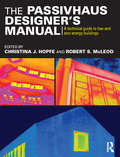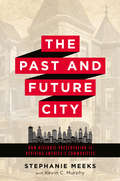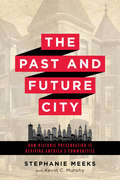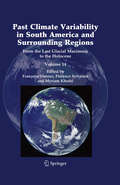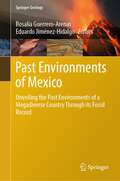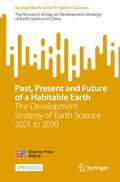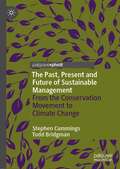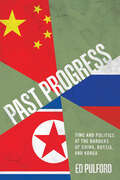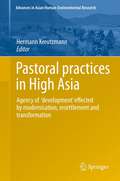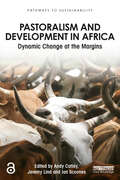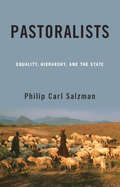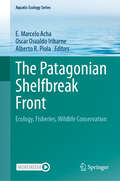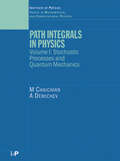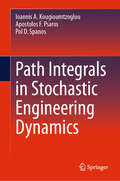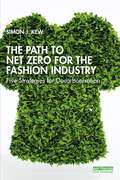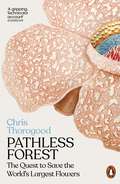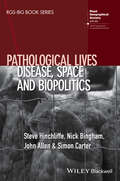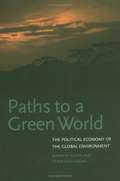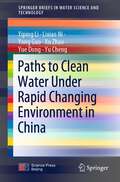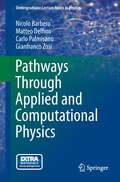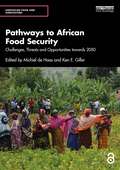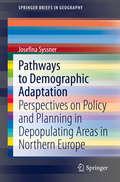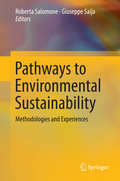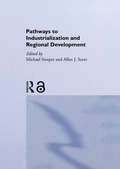- Table View
- List View
The Passivhaus Designer’s Manual: A technical guide to low and zero energy buildings
by Christina J. Hopfe Robert S. McLeodPassivhaus is the fastest growing energy performance standard in the world, with almost 50,000 buildings realised to date. Applicable to both domestic and non-domestic building types, the strength of Passivhaus lies in the simplicity of the concept. As European and global energy directives move ever closer towards Zero (fossil) Energy standards, Passivhaus provides a robust ‘fabric first’ approach from which to make the next step. The Passivhaus Designers Manual is the most comprehensive technical guide available to those wishing to design and build Passivhaus and Zero Energy Buildings. As a technical reference for architects, engineers and construction professionals The Passivhaus Designers Manual provides: State of the art guidance for anyone designing or working on a Passivhaus project; In depth information on building services, including high performance ventilation systems and ultra-low energy heating and cooling systems; Holistic design guidance encompassing: daylight design, ecological materials, thermal comfort, indoor air quality and economics; Practical advice on procurement methods, project management and quality assurance; Renewable energy systems suitable for Passivhaus and Zero Energy Buildings; Practical case studies from the UK, USA, and Germany amongst others; Detailed worked examples to show you how it’s done and what to look out for; Expert advice from 20 world renowned Passivhaus designers, architects, building physicists and engineers. Lavishly illustrated with nearly 200 full colour illustrations, and presented by two highly experienced specialists, this is your one-stop shop for comprehensive practical information on Passivhaus and Zero Energy buildings.
The Past and Future City: How Historic Preservation is Reviving America's Communities
by Ms Stephanie Meeks Mr Kevin C. MurphyInThe Past and Future City,Stephanie Meeks, the president of the National Trust for Historic Preservation, describes in detail, and with unique empirical research, the many ways that saving and restoring historic fabric can help a city create thriving neighborhoods, good jobs, and a vibrant economy. She explains the critical importance of preservation for all our communities, the ways the field of historic preservation has evolved to embrace the challenges of the twenty-first century, and the innovative work being done in the preservation space now.This book is for anyone who cares about cities, places, and saving America's diverse stories in a way that will bring us together and help us better understand our past, present, and future.
The Past and Future City: How Historic Preservation is Reviving America's Communities
by Ms Stephanie Meeks Mr Kevin C. MurphyInThe Past and Future City,Stephanie Meeks, the presidof the National Trust for Historic Preservation, describes in detail, and with unique empirical research, the many ways that saving and restoring historic fabric can help a city create thriving neighborhoods, good jobs, and a vibrant economy. She explains the critical importance of preservation for all our communities, the ways the field of historic preservation has evolved to embrace the challenges of the twenty-first century, and the innovative work being done in the preservation space now.This book is for anyone who cares about cities, places, and saving America's diverse stories in a way that will bring us together and help us better understand our past, present, and future.
Past Climate Variability in South America and Surrounding Regions
by Florence Sylvestre Francoise Vimeux Myriam KhodriThis book groups together overviews and original research papers dealing with South American climate variability from the Last Glacial Maximum to the Holocene. The contributions deal with tropical, temperate and high latitudes climate variability in South America and in surrounding regions (including Pacific and Atlantic Oceans and Antarctica). It offers results obtained from both natural climate archives and recent simulations from coupled climate models. The objective is to propose a state of the art about our knowledge of past climate variability in South America. Specifically, this book aims at presenting the whole available observations and at discussing climate mechanisms, specifically the low to high latitude teleconnections on that continent which spreads out from the equator to Patagonia. It is written by an expert group of climate change scientists, and presents an insight into dynamics of the past and provides climate modellers with work of reference for data-model comparison. The book is an advanced but very readable text essential for all students and scientists interested in global environmental change.
Past Environments of Mexico: Unveiling the Past Environments of a Megadiverse Country Through its Fossil Record (Springer Geology)
by Rosalía Guerrero-Arenas Eduardo Jiménez-HidalgoMexico is a biodiverse country. The dynamics of environments from Mexico played a crucial role in the history of North American biota. This book analyzes the paleoenvironmental conditions using several biological groups and various methods. This book also demonstrates how this information is specifically used to elucidate Mexico‘s past environments and habitats (terrestrial, freshwater, and marine). This book fills an existing editorial gap since much of the information is dispersed in several bibliographic sources. The authors are active paleontologists in diverse Mexican universities and research centers. Their research activities contribute to the knowledge of the Mexican biota through geologic time.
Past, Present and Future of a Habitable Earth: The Development Strategy of Earth Science 2021 to 2030 (SpringerBriefs in Earth System Sciences)
by Res. Group Dev Strategy of Earth ScienceThis perspective of this book views Earth's various layers as a whole system, and tries to understand how to achieve harmony and sustainable development between human society and nature, with the theme of " habitability of the Earth." This book is one effort at providing an overview of some of the recent exciting advances Chinese geoscientists have made. It is the concerted team effort of a group of researchers from diverse backgrounds to generalize their vision for Earth science in the next 10 years. The book is intended for scholars, administrators of the Science and Technology policy department, and science research funding agencies. This is an open access book.
The Past, Present and Future of Sustainable Management: From the Conservation Movement to Climate Change
by Stephen Cummings Todd BridgmanWe might think sustainable management is a new idea, created in the 1960s by enlightened modern scientists. We might think that it puts us on a new path, beyond what management was originally about. But this is not true. Sustainable management is as old as civilization and was a foundation stone of management science as it was formed in the first decade of the 20th century. Recovering this forgotten past provides deeper roots and greater traction to advance sustainable management in our own times.This book charts a history of sustainable management from premodern times, through the birth of management science as an offshoot of the conservation movement, to the present day. The authors argue that modern tools like Triple Bottom Line reporting and multiple Sustainable Development Goals may be less useful than a return to a more fundamental and holistic view of management.
Past Progress: Time and Politics at the Borders of China, Russia, and Korea
by Ed PulfordWhile anxiety abounds in the old Cold War West that progress – whether political or economic – has been reversed, for citizens of former-socialist countries, murky temporal trajectories are nothing new. Grounded in the multiethnic frontier town of Hunchun at the triple border of China, Russia, and North Korea, Ed Pulford traces how several of global history's most ambitiously totalizing progressive endeavors have ended in cataclysmic collapse here. From the Japanese empire which banished Qing, Tsarist, and Choson dynastic histories from the region, through Chinese, Soviet, and Korean socialisms, these borderlands have seen projections and disintegrations of forward-oriented ideas accumulate on a grand scale. Taking an archaeological approach to notions of historical progress, the book's three parts follow an innovative structure moving backwards through linear time. Part I explores "post-historical" Hunchun's diverse sociopolitics since high socialism's demise. Part II covers the socialist era, discussing cross-border temporal synchrony between China, Russia, and North Korea. Finally, Part III treats the period preceding socialist revolutions, revealing how the collapse of Qing, Tsarist, and Choson dynasties marked a compound "end of history" which opened the area to projections of modernity and progress. Examining a borderland across linguistic, cultural, and historical lenses, Past Progress is a simultaneously local and transregional analysis of time, borders, and the state before, during, and since socialism.
Pastimes: The Context of Contemporary Leisure (Fifth Edition)
by Ruth V. RussellOriginally published in 1996, "Pastimes" introduced an exciting new text that explored leisure and recreation philosophy and science, the various subfields, and the leisure services industry. The purpose of this fifth edition of Pastimes is to extend the discussion about leisure in society to new concepts supported by new research findings and commentary. Throughout, the author has pursued the most interesting, relevant, exciting, and contemporary information possible. First, as an introduction to the phenomenon of leisure, the book must be current. Momentous changes, actual and alleged, have always been the root of leisure expressions and experiences. To match, Pastimes again reflects a wide range of material from the disciplines of leisure studies, sociology, psychology, economics, political science, anthropology, geography, the humanities, and media and cultural studies. Second, as a learning tool, this fifth edition teaches more. It contains new illustrations of concepts through field-based cases, biographical features, exploratory activities, and research studies. While the basic organisation remains similar, in addition to new material, some former concepts have been relocated. For example, the topic of history and its meanings for leisure is now combined into one chapter. Also, the discussion of work is now combined with that about economics in the same chapter. Also, theories explaining leisure behaviour are now organised according to their home discipline. A chapter on well-being and leisure is a new feature, and because of the amazing speed of change, the chapter on leisure and technology has been completely rewritten. The chapter on time has also been expanded. Finally, the last chapter on leisure systems has a new section on professional preparation. But, more than a textbook, Pastimes is very much a point of view. Leisure is presented as a human phenomenon that is individual and collective, vital and frivolous, historical and contemporary, factual and subjective, good and bad.
Pastoral practices in High Asia
by Hermann KreutzmannIn conventional views, pastoralism was classified as a stage of civilization that needed to be abolished and transcended in order to reach a higher level of development. In this context, global approaches to modernize a rural society have been ubiquitous phenomena independent of ideological contexts. The 20th century experienced a variety of concepts to settle mobile groups and to transfer their lifestyles to modern perceptions. Permanent settlements are the vivid expression of an ideology-driven approach. Modernization theory captured all walks of life and tried to optimize breeding techniques, pasture utilization, transport and processing concepts. New insights into other aspects of pastoralism such as its role as an adaptive strategy to use marginal resources in remote locations with difficult access could only be understood as a critique of capitalist and communist concepts of modernization. In recent years a renaissance of modernization theory-led development activities can be observed. Higher inputs from external funding, fencing of pastures and settlement of pastoralists in new townships are the vivid expression of 'modern' pastoralism in urban contexts. The new modernization programme incorporates resettlement and transformation of lifestyles as to be justified by environmental pressure in order to reduce degradation in the age of climate change.
Pastoralism and Development in Africa: Dynamic Change at the Margins (Pathways to Sustainability)
by Author UnknownOnce again, the Horn of Africa has been in the headlines. And once again the news has been bad: drought, famine, conflict, hunger, suffering and death. The finger of blame has been pointed in numerous directions: to the changing climate, to environmental degradation, to overpopulation, to geopolitics and conflict, to aid agency failures, and more. But it is not all disaster and catastrophe. Many successful development efforts at ‘the margins’ often remain hidden, informal, sometimes illegal; and rarely in line with standard development prescriptions. If we shift our gaze from the capital cities to the regional centres and their hinterlands, then a very different perspective emerges. These are the places where pastoralists live. They have for centuries struggled with drought, conflict and famine. They are resourceful, entrepreneurial and innovative peoples. Yet they have been ignored and marginalised by the states that control their territory and the development agencies who are supposed to help them. This book argues that, while we should not ignore the profound difficulties of creating secure livelihoods in the Greater Horn of Africa, there is much to be learned from development successes, large and small. This book will be of great interest to students and scholars with an interest in development studies and human geography, with a particular emphasis on Africa. It will also appeal to development policy-makers and practitioners.
Pastoralists: Equality, Hierarchy, and the State
by Philip Carl SalzmanDrawing upon the author's extensive field research among pastoral peoples in the Middle East, India, and the Mediterranean, and on more than 30 years of comparative study of pastoralists around the world, Pastoralists is an authoritative synthesis of the varieties of pastoral life. At an ethnographic level, the concise volume provides detailed analyses of divergent types of pastoral societies, including segmentary tribes, tribal chiefdoms, and peasant pastoralists. At the same time, it addresses a set of substantive theoretical issues: ecological and cultural variation, equality and inequality, hierarchy and the basis of power, and state power and resistance. The book validates "pastoralists" as a conceptual category even as it reveals the diversity of societies, subsistence strategies, and power arrangements subsumed by that term.
The Patagonian Shelfbreak Front: Ecology, Fisheries, Wildlife Conservation (Aquatic Ecology Series #13)
by E. Marcelo Acha Oscar Osvaldo Iribarne Alberto R. PiolaThis book provides a compilation of basic information on the topic of the Patagonian Shelfbreak front, but integrally reanalyzes this under modern paradigms. The book provides a synthesis of the ecosystem characteristics, encompassing physical and chemical oceanography, plankton, nekton and benthos communities, fisheries and conservation issues. It provides hypothesis to guide future research, and recommendations for policymakers and stakeholders. Fronts play key roles in marine ecosystems, and shelfbreak fronts are ubiquitous elsewhere in the world ocean, broadening the interest of our proposal. The Patagonian shelfbreak front is a hot spot of marine life, with several associated fisheries and intensive use by marine birds and mammals. This book will contribute to fill the information gap of the Southwestern Atlantic, a region where there is a growing interest in terms of conservation and management actions. Its primary audience are researchers and postgraduate students, being also relevant for conservation scientists and resource managers.
Path Integrals in Physics: Volume I Stochastic Processes and Quantum Mechanics
by M Chaichian A DemichevPath Integrals in Physics: Volume I, Stochastic Processes and Quantum Mechanics presents the fundamentals of path integrals, both the Wiener and Feynman type, and their many applications in physics. Accessible to a broad community of theoretical physicists, the book deals with systems possessing a infinite number of degrees in freedom. It discusses the general physical background and concepts of the path integral approach used, followed by a detailed presentation of the most typical and important applications as well as problems with either their solutions or hints how to solve them. It describes in detail various applications, including systems with Grassmann variables. Each chapter is self-contained and can be considered as an independent textbook. The book provides a comprehensive, detailed, and systematic account of the subject suitable for both students and experienced researchers.
Path Integrals in Stochastic Engineering Dynamics
by Ioannis A. Kougioumtzoglou Pol D. Spanos Apostolos F. PsarosThis book organizes and explains, in a systematic and pedagogically effective manner, recent advances in path integral solution techniques with applications in stochastic engineering dynamics. It fills a gap in the literature by introducing to the engineering mechanics community, for the first time in the form of a book, the Wiener path integral as a potent uncertainty quantification tool. Since the path integral flourished within the realm of quantum mechanics and theoretical physics applications, most books on the topic have focused on the complex-valued Feynman integral with only few exceptions, which present path integrals from a stochastic processes perspective. Remarkably, there are only few papers, and no books, dedicated to path integral as a solution technique in stochastic engineering dynamics. Summarizing recently developed techniques, this volume is ideal for engineering analysts interested in further establishing path integrals as an alternative potent conceptual and computational vehicle in stochastic engineering dynamics.
The Path to Net Zero for the Fashion Industry: Five Strategies for Decarbonisation
by Simon J. KewThis book uses a quantitative science-based approach to explain where the greenhouse gas (GHG) emissions emitted by the fashion industry are generated and it explores what strategies can be deployed to achieve Net Zero by 2050. With GHG emissions currently predicted to triple by the middle of the century, the fashion industry is far off course to reach Net Zero, as set out in the Paris Agreement. With misinformation and greenwashing representing an ever-growing barrier to potential solutions, the book aims to demystify the source of GHG emissions from the industry, breaking down in detail their origin, while identifying the steps that can be taken when designing and sourcing new products. Detailing the market drivers and trends in fashion consumption, it argues that change should be guided by science-based quantitative principles. Accessibly written with key insights at the end of each chapter, this book will enable the reader to understand the tactics to tackle decarbonisation, and ultimately outline five main strategies that can be deployed by the fashion and textile industries to align with the Paris Agreement. This book serves as a practical guide for designers, buyers and the fashion industry in general to develop and understand approaches and strategies to reduce energy consumption and the resulting GHG emissions to reach Net Zero.
Pathless Forest: The Quest to Save the World’s Largest Flowers
by Dr Chris ThorogoodThe incredible story of one man's obsession to find and protect the world's largest flowers As a child, Chris Thorogood dreamed of seeing Rafflesia - the plant with the world's largest flowers. He crafted life-size replicas in an abandoned cemetery, carefully bringing them to life with paper and paint. Today he is a botanist at the University of Oxford's Botanic Garden and has dedicated his life to studying the biology of such extraordinary plants, working alongside botanists and foresters in Southeast Asia to document these huge, mysterious blooms.Pathless Forest is the story of his journey to study and protect this remarkable plant - a biological enigma, still little understood, which invades vines as a leafless parasite and steals its food from them. We join him on a mind-bending adventure, as he faces a seemingly impenetrable barrier of weird, wonderful and sometimes fearsome flora; finds himself smacking off leeches, hanging off vines, wading through rivers; and following indigenous tribes into remote, untrodden rainforests in search of Rafflesia's ghostly, foul-smelling blooms, more than a metre across.We depend on plants for our very existence, but two in five of the world's species are threatened with extinction - nobody knows how many species of Rafflesia might already have disappeared through deforestation. Pathless Forest is part thrilling adventure story and part an inspirational call to action to safeguard a fast-disappearing wilderness. To view plants in a different way, as vital for our own future as for that of the planet we share. And to see if Rafflesia itself can be saved.
Pathological Lives: Disease, Space and Biopolitics
by John Allen Nick Bingham Simon Carter Steve HinchliffePandemics, epidemics and food borne diseases are a major global challenge. Focusing on the food and farming sector, and mobilising social theory as well as empirical enquiry, Pathological Lives investigates current approaches to biosecurity and ask how pathological lives can be successfully ‘regulated’ without making life more dangerous as a result. Uses empirical and social theoretical resources developed in the course of a 40-month research project entitled ‘Biosecurity borderlands’ Focuses on the food and farming sector, where the generation and subsequent transmission of disease has the ability to reach pandemic proportions Demonstrates the importance of a geographical and spatial analysis, drawing together social, material and biological approaches, as well as national and international examples The book makes three main conceptual contributions, reconceptualising disease as situated matters, the spatial or topological analysis of situations and a reformulation of biopolitics Uniquely brings together conceptual development with empirically and politically informed work on infectious and zoonotic disease, to produce a timely and important contribution to both social science and to policy debate
Paths to a Green World: The Political Economy of the Global Environment
by Jennifer Clapp Peter DauvergneThis comprehensive and accessible text fills the need for a political economy view of global environmental politics, focusing on the ways key economic processes affect environmental outcomes.
Paths to Clean Water Under Rapid Changing Environment in China (SpringerBriefs in Water Science and Technology)
by Yiping Li Lixiao Ni Yong Guo Xu Zhao Yue Dong Yu ChengThis book mainly provides the current status of water pollution faced by China under rapid changing environment and the actions that have been taken for prevention and treatment of water pollution. It points out that the water pollution situation is severe. Facing water pollution, China’s experiences include several aspects on source control and pollution interception, internal nutrient removal of sediment, ecological restoration, and water transfer policy. There exists both the opportunity and challenge for the prevention and control of water pollution in China. The book contains numerous charts and diagrams which further illustrating China’s paths to clean water.
Pathways Through Applied and Computational Physics
by Nicolò Barbero Matteo Delfino Carlo Palmisano Gianfranco ZosiThis book is intended for undergraduates and young researchers who wish to understand the role that different branches of physics and mathematics play in the execution of actual experiments. The unique feature of the book is that all the subjects addressed are strictly interconnected within the context of the execution of a single experiment with very high accuracy, namely the redetermination of the Avogadro constant NA, one of the fundamental physical constants. The authors illustrate how the basic laws of physics are applied to describe the behavior of the quantities involved in the measurement of NA and explain the mathematical reasoning and computational tools that have been exploited. It is emphasized that all these quantities, although pertaining to a specific experiment, are of wide and general interest. The book is organized into chapters covering the interaction of electromagnetic radiation with single crystals, linear elasticity and anisotropy, propagation of thermal energy, anti-vibration mounting systems, and data analysis and B-spline interpolation. An essential feature is the focus on the role of Mathematica, an invaluable, fully integrated software environment for handling diverse scientific and technical computations.
Pathways to African Food Security: Challenges, Threats and Opportunities towards 2050 (Earthscan Food and Agriculture)
by Michiel De Haas Ken E. GillerThis book examines Africa’s current food system and future challenges for food security over the next 25 years.Africa is on the rise and by 2050, the continent will be home to a quarter of the world’s population. The analysis presented in this book clearly shows that the African food system needs to transform at a much faster pace to ensure that the people it serves are food secure. This book begins with four contrasting case studies that focus on country-specific challenges in Egypt, Ethiopia, Senegal and Zimbabwe. This is followed by 15 thematic chapters organised in three sections on challenges, threats and opportunities. Individual chapters address a wide range of topics including climate change, water security, farm sizes, crop yields, conservation trade-offs, food prices, trade, conflict and structural change. The book concludes by discussing key pathways to improve Africa's food system and food security for the decades ahead.This book is essential reading for students, scholars and practitioners who work on global food security, sustainable food systems, food, health and nutrition and African development.
Pathways to Demographic Adaptation: Perspectives on Policy and Planning in Depopulating Areas in Northern Europe (SpringerBriefs in Geography)
by Josefina SyssnerThis book builds on case studies in depopulating and shrinking areas in Northern Europe. While most contemporary literature on shrinkage focuses on these issues from a planning standpoint, this book uniquely applies a policy perspective when approaching the material. The book assesses the potential of demographic adaptation policies to manage depopulation, that is, policy programs aiming at managing depopulation through adaptation, rather than through growth policies intended to foster population growth. In 6 chapters, the book acts as an up-to-date resource on demographic adaptation for master and Ph.D. students, researchers, and practitioners working in local and regional development, governance, and planning. Chapter 1 gives an overview of recent demographic trends in Northern Europe and introduces the theoretical differences between growth policy and adaptation policy. Chapter 2 accounts for the policy concept and introduces a framework for how local adaptation policies could be systematically analysed. Chapter 3 suggests that the Nordic welfare states exhibit two characteristics that prove to be relevant when discussing the consequences and policy implications of demographic decline, i.e. an extremely sparse population structure and an ambitious welfare assignment that in many respects has been devolved to the local level of government. Chapter 4 suggests that whether shrinkage constitutes a problem or not depends upon the interpretations of those in power, but also upon political, economic and geographic conditions Chapter 5 seeks to understand why local level policymakers avoid developing strategies for how to handle long-term population decline. Chapter 6 summarizes the points of the previous chapters, and concludes that local governments in shrinking areas ought to develop local adaptation policies. These policies, however, also need to be subjected to critical analysis, and the chapter introduces a model for how local adaptation policy priorities could be assessed in a more structured manner.
Pathways to Environmental Sustainability
by Roberta Salomone Giuseppe SaijaThis book brings together, in a single volume, an overview of multiple applications of the concept of environmental sustainability, featuring examples of useful methodologies and tools for pursuing environmental targets, experiences and case studies spanning a variety of sectors, embracing both industry and research projects; and case studies applied to very different territorial contexts. The first section of the book covers methodologies and tools for environmental sustainability, including Industrial Ecology, Urban Metabolism, Life Cycle Assessment, analysis of industrial water footprint and such chemical technologies as Hypercritical Separation Technology (HYST). Part Two provides case studies of environmental sustainability in specific industrial sectors including electronics, pharmaceutical manufacturing, bio-energy, agriculture, food and residential construction retrofitting. Part Three explores experiences of environmental sustainability in territorial contexts on a local, regional or national scale. This section includes chapters on sustainability in the Republic of San Marino, the European "Covenant of Mayors" urban sustainability initiative and efforts to promote sustainability in Italy, Norway and Poland among others. The book concludes with a discussion of Common Agricultural Policy (CAP) in Objective I regions of Italy. Featuring the contributions of academics, managers operating in various productive sectors and consultants, the book aims to promote the growth and spread of scientific research and technological development for environmental sustainability.
Pathways to Industrialization and Regional Development
by Michael Storper Allen J. ScottThe world has seen a shift in socio-economic relations, in the patterns and processes of industrialization and regional development. The social regulation of the economic order, flexible production organization and industrial district formation have brought periods, places and pathways to the heart of economic debate. Pathways to Industrialization and Regional Development provides a platform from which to address a new economic order. All the major schools of thought are represented. Focussing upon the interactions between economic logic and political institutions at both the local and global levels, the authors set the agenda for the 1990s.
